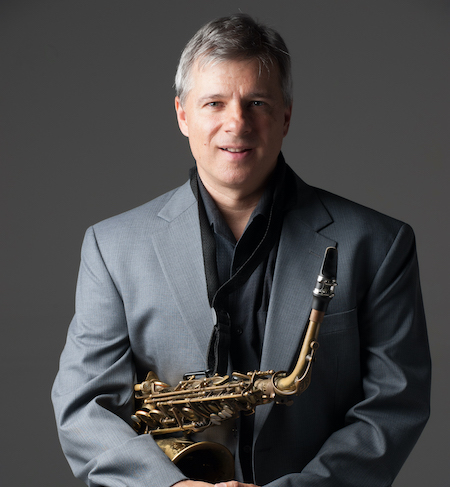Jan 13, 2026 2:09 PM
More Trump-Kennedy Center Cancellations
The fallout from the renaming of the John F. Kennedy Center for the Performing Arts to include President Donald…

“In many ways, truth has been stranger than fiction, and that is what I have been feeling,” Gordon says.
(Photo: Courtesy of Artist)As a young boy living amid poverty and dysfunction in a home on Staten Island, Jon Gordon clung to the thought that the brilliant baritone saxophonist Bob Gordon had been his father. As it turned out, Bob, his alcoholic mother’s first husband, was nothing of the sort — as Jon discovered around age 10.
Despite this, or because of it, Jon, who is now 54, learned to be resourceful early on. He took up the saxophone and — as he says, aided by musical “fathers” like Phil Woods, Charles McPherson and Eddie Locke — improbably became one of the sharpest and most sensitive players on the scene today.
“It’s an odd background,” he allowed in a November Zoom call.
Yet, he added, it seems a little less odd in a world in which the improbable — one in which alternative facts and authoritarian leaders are ascendant — has become real. And that has fostered in him a desire to explore the nature of reality itself.
“In recent years there’s been a reality divide, and that was something I’ve been thinking about in my own life,” he said. “In many ways, truth has been stranger than fiction, and that is what I have been feeling.”
The vehicle for his exploration is Stranger Than Fiction (ArtistShare). The album, out late last summer, is his first nonet collection in 12 years. While its 10 tracks, all originals, are neither explicitly political nor relentlessly personal — they do not wave banners or wallow in misery — they shrewdly convey a sense of the present-day disorientation.
Led by Gordon’s understated alto saxophone, the title tune plays with implication and misdirection — weaving its way through various permutations of the melody until, about six minutes into the seven-minute track, it suddenly settles into a vamp topped by a Fabio Ragnelli drum solo. Coming out of the vamp, the tune winds down and the theme never returns.
“I was thinking not to have a standard kind of motion and development,” Gordon said. “The idea is to displace that sense of where you expect it to go.”
A similar sense of displacement is conjured by the opener, “Pointillism.” On it, the members of the nonet improvise freely, creating spikey textures their painting counterparts might recognize — but with a cool abstraction they might not. In its asymmetric ebb and flow, the work never quite offers the ear a safe spot on which to land.
Yet the effort coheres, and that is no small wonder. Like the entire set of tunes, it was recorded in stages, with five musicians in isolation booths laying down a basic track in a Winnipeg, Manitoba, studio and the rest adding their parts later from locations elsewhere in Canada and the U.S. Gordon then put it all together in post-production.
“I thought, ‘Let’s see what’s possible if you put paint on canvas and shape it,’” he said.
Pandemic driven, the recording arrangements seem to feed a theme of social disconnectedness. Guitarist Jocelyn Gould, 30, said that while she felt uncomfortably separated when she first entered the studio in October 2020 — after finally emerging from quarantine, the band was again positioned at an unaccustomed remove, this time by masks and social distancing — the setup ultimately yielded interpretive dividends.
“It was a new thing, very bizarre, and we were still in a state of shock, wondering what was happening to the world,” she said. But, she added, “When I listen to the album, I hear a bit of an improvised feeling, a unique vibe we wouldn’t have gotten if we had been playing for six months.”
Gordon deals with music and life with yogic equanimity. He has quietly but forcefully overcome privation; taken on competitors, like those he vanquished in winning the 1996 Thelonious Monk Institute of Jazz International Saxophone Competition; and controlled his artistic destiny, adopting the crowdfunding ArtistShare model a decade-and-a-half ago.
“What I really like about it,” he said, “is that, at the end of the day, what I’m not happy with I’m responsible for.” DB

Belá Fleck during an interview with Fredrika Whitfield on CNN.
Jan 13, 2026 2:09 PM
The fallout from the renaming of the John F. Kennedy Center for the Performing Arts to include President Donald…

Peplowski first came to prominence in legacy swing bands, including the final iteration of the Benny Goodman Orchestra, before beginning a solo career in the late 1980s.
Feb 3, 2026 12:10 AM
Ken Peplowski, a clarinetist and tenor saxophonist who straddled the worlds of traditional and modern jazz, died Feb. 2…

The success of Oregon’s first album, 1971’s Music Of Another Present Era, allowed Towner to establish a solo career.
Jan 19, 2026 5:02 PM
Ralph Towner, a guitarist and composer who blended multiple genres, including jazz — and throughout them all remained…

Rico’s Anti-Microbial Instrument Swab
Jan 19, 2026 2:48 PM
With this year’s NAMM Show right around the corner, we can look forward to plenty of new and innovative instruments…

Richie Beirach was particularly renowned for his approach to chromatic harmony, which he used to improvise reharmonizations of originals and standards.
Jan 27, 2026 11:19 AM
Richie Beirach, a pianist and composer who channeled a knowledge of modern classical music into his jazz practice,…